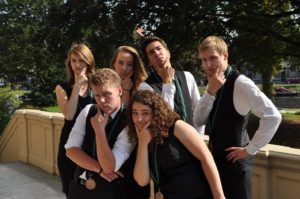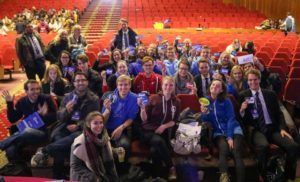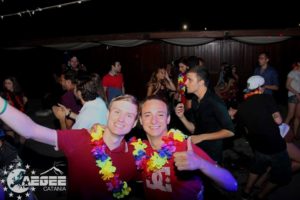Daniël Amesz from AEGEE-Leiden candidates for the Mediation Commission. He was interested in the Mediation Commission from the beginning, but he feels that the perfect time to apply is right now. He explains why and answers other questions regarding his application.
The AEGEEan: How would you describe yourself in three words, and why?
 Daniël: The three words I’d use are dedication, enthusiasm and hugs. Starting with the last, everyone that knows me will immediately understand what I mean. I am a big fan of hugging and what it represents: close friendships and feeling comfortable with other people. Basically I’m a permanent free hugs dispenser. I realise that almost everyone can be enthusiastic, but the reason I chose this word is that most of my friends will agree that I am often a little bit too enthusiastic about things they might completely not care about. It happens quite a lot that I’m talking about, for example, a random European monarch from the 17th century and halfway through my story I notice that people are clearly not as interested as I am… Finally, I don’t quit something once I’ve started it and put in a lot of effort to make it as good as possible, that is also why I did not apply in Chișinău, because at the time I wouldn’t have been able to invest the time that I now can.
Daniël: The three words I’d use are dedication, enthusiasm and hugs. Starting with the last, everyone that knows me will immediately understand what I mean. I am a big fan of hugging and what it represents: close friendships and feeling comfortable with other people. Basically I’m a permanent free hugs dispenser. I realise that almost everyone can be enthusiastic, but the reason I chose this word is that most of my friends will agree that I am often a little bit too enthusiastic about things they might completely not care about. It happens quite a lot that I’m talking about, for example, a random European monarch from the 17th century and halfway through my story I notice that people are clearly not as interested as I am… Finally, I don’t quit something once I’ve started it and put in a lot of effort to make it as good as possible, that is also why I did not apply in Chișinău, because at the time I wouldn’t have been able to invest the time that I now can.
Why are you interested in the Mediation Commission?
As I said in my application, the MedCom fascinated me from the moment I learnt what they did during Agora Cagliari. Both the theory and practice of mediation is something I find very interesting and would like to become better at. Also, it is one of the most people orientated commissions within AEGEE and you really focus on helping people that have a problem. I find it very motivating to be constantly challenged to find the best possible solution for everyone involved and hopefully make a positive change in every situation.
During your board year, did you have direct experience with conflicts between committees? If so, in what way did you solve these conflicts? If not, what things did you do to prevent conflicts?
Luckily there weren’t any conflicts between different committees. Communication is the magic word here. To prevent problems between groups it is important that they are aware of each other’s tasks and goals to make sure there is an understanding of why. Then it’s important to keep everybody informed about areas where tasks or goals may overlap so that there is an understanding of how. An example would be to coordinate when committees are allowed to promote their activities, to prevent them from being in each other’s way. There were, however, conflicts within committees between the different members. In these cases I would try to mediate and solve the problem. Organising a meeting to discuss the issues or calling those involved to hear the different stories. Team-building is very important in trying to prevent internal conflicts.
You mention regarding your programme that you want to establish frameworks to prevent possible disputes and conflicts such as a training in communication. How do you see these trainings being implemented more concretely?
The MedCom could work on a written guide that explains communication techniques, specifically designed for AEGEE’s structure and culture. This could include tips and tricks on listening, academic theory on team roles and a sort of checklist on how to give feedback. This could then also be adapted into an LTC template that locals can use to train their members and into workshops that can be given during NWM’s and/or even Agora.
You mentioned that you first wanted to gain more AEGEE experience, before applying for this Commission. What kind of valuable experiences did you gain in the past years so that you feel comfortable now to apply?
 A lot of it has to do with knowledge about the association and how it works. During a board year you learn so much about the different aspects and relations of both a local and the Network as a whole. This is also aided by just going to a lot of different (statutory) events. Besides that, I have gained a lot of experience in the processes of team work and communication, exactly the type of knowledge that I want to help spread throughout the network as MedCom. Finally, during my board year, but also very much during my time as Chair of the local Agora, I became very aware of the different types of rules and regulations that AEGEE locals and bodies deal with. Getting to know all of these and making sure they are followed in the correct way can be a lot harder than it seems. Especially for a body like the MedCom it is important that you know your way around the rules and have experience with interpreting vague lines of text into a world that is much more complex than the rules can cover.
A lot of it has to do with knowledge about the association and how it works. During a board year you learn so much about the different aspects and relations of both a local and the Network as a whole. This is also aided by just going to a lot of different (statutory) events. Besides that, I have gained a lot of experience in the processes of team work and communication, exactly the type of knowledge that I want to help spread throughout the network as MedCom. Finally, during my board year, but also very much during my time as Chair of the local Agora, I became very aware of the different types of rules and regulations that AEGEE locals and bodies deal with. Getting to know all of these and making sure they are followed in the correct way can be a lot harder than it seems. Especially for a body like the MedCom it is important that you know your way around the rules and have experience with interpreting vague lines of text into a world that is much more complex than the rules can cover.
You would like to learn more about privacy issues within AEGEE and what is possible to improve in this field. Do you think the Mediation Commission is the right platform to do so?
 To be honest, I think the MedCom is quite a weird body to be responsible for so much regarding the Data Privacy Policy Statement. Whenever I explain to outsiders what I’m applying for, they go “What?” when I start talking about the privacy part. This might be because I’m not good enough at explaining it yet, but there is some strangeness to it. Regardless, as Ombudsman of the data of our members it is important to know as much as possible about how it works and I always aim to improve things where possible.
To be honest, I think the MedCom is quite a weird body to be responsible for so much regarding the Data Privacy Policy Statement. Whenever I explain to outsiders what I’m applying for, they go “What?” when I start talking about the privacy part. This might be because I’m not good enough at explaining it yet, but there is some strangeness to it. Regardless, as Ombudsman of the data of our members it is important to know as much as possible about how it works and I always aim to improve things where possible.
Which skill do you think you will develop being active in the Mediation Commission?
I hope to learn more on (inter)cultural conflict resolution. One of the greatest benefits of AEGEE is the diversity of our members. At some points however, this can also lead to challenges. Sometimes a cultural difference between two members or between a member and the Mediation Commission can lead to misunderstandings. Recognising these differences and understanding each other is a skill I would look forward to further develop.
You can read his full candidature here.
Written by Susan Nijsten, AEGEE-Groningen

